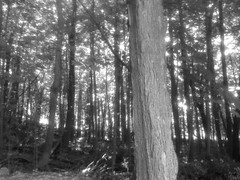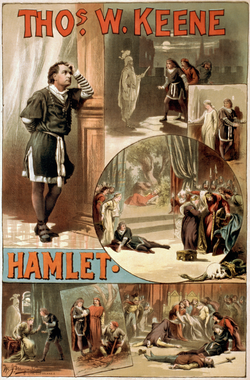I have been one acquainted with the night.
I have walked out in rain --and back in rain.
I have outwalked the furthest city light.
I have looked down the saddest city lane.
I have passed by the watchman on his beat
And dropped my eyes, unwilling to explain.
I have stood still and stopped the sound of feet
When far away an interrupted cry
Came over houses from another street,
But not to call me back or say good-bye;
And further still at an unearthly height
One luminary clock against the sky
Proclaimed the time was neither wrong nor right.
I have been one acquainted with the night.This poem was rather dark and brooding (I was somewhat surprised Frost wrote it!), and it leaves you with chills. It's not exactly The End of All Hope, but it's still something of a fall from grace, almost, that happens. Suddenly, you're immersed in the dark corners of life, those things that hide from the sun, the dark energy that flows beneath our feet, like the diligent editors who keep Wikipedia afloat.
The speaker here is just getting to know the night, as the title indicates, acquainted, not a particularly close relationship, i.e., just somebody to know but by no means a friend.
One of my favorite lines from the poem, "I have outwalked the furthest city light" really adds to the dismal nature of things, laying out the groundwork for things to come. It's like entering into where things start getting shaky, leaving your podunk little town for a ghost city, a place detached from everything, so lonely and ominous, yet without danger, simply because fear has packed up and moved north.
All the figures in the poem also seem very far removed and nonchalant about things, from the watchman to the "luminary clock against the sky", which both seem to hold use for a moment, because it seems that either one will bring about some sort of action into the poem.
The interrupted cry could have been anything, really, but it was everything except for a cry to him. Instead of investigating, Frost simply moves on, perhaps to jilt us somehow or to say that he's acquainted - but not friendly - with the night. I suspect it's the latter.
In all, this is a brilliant little poem I can recommend!
Further Reading:
The text of the poem on Portitude
http://www.portitude.org/literature/frost/pt-acquainted_with_the_night.php
Shmoop, for an analysis of the poem
http://www.shmoop.com/acquainted-with-night/
There's good news regarding The Hunger Games! The third and final (as far as we know) book has been unveiled, it's called Mockingjay.
Here's the cover:
http://nmplteenblog.blogspot.com/2010/02/hunger-games-3rd-book-cover-revealed.html



